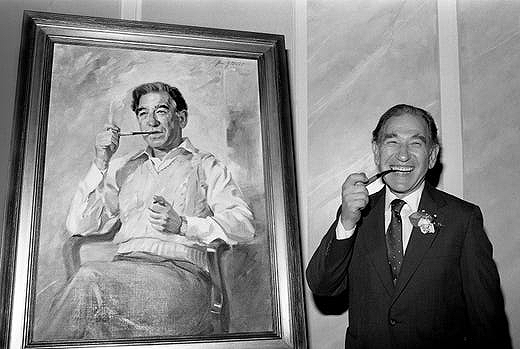By Lorena Infante Lara

Dr. Stanley Cohen, Vanderbilt University emeritus faculty and Nobel Prize winner, passed away Wednesday morning. He was 97 years old.
Born in Brooklyn, New York, in 1922, Cohen was the child of Russian and Jewish immigrants who came to the United States in the early 1900s. Although he grew up with limited resources, his parents encouraged his academic proclivities and he eventually attended Brooklyn College, a city college with a policy of no tuition. He graduated with a degree in biology and chemistry, motivated by his desire to understand the chemistry that drives embryo development.
To save enough money for graduate school, Cohen briefly worked as a bacteriologist at a milk processing plant, and went on to earn a master’s degree in zoology from Oberlin College and a doctorate Ph.D. in biochemistry from the University of Michigan in 1948.
After completing his doctorate, Cohen briefly worked at the University of Colorado, but moved on to Washington University in St. Louis in 1952 to work on new radioisotope techniques. While there, he worked with the new chair of the Department of Microbiology, Dr. Arthur Kornberg, who went on to earn the Nobel Prize in Physiology or Medicine in 1959. At Washington University, Cohen also began a fruitful collaboration with Dr. Rita Levi-Montalcini, working with her as a postdoctoral fellow. This early work formed the basis for a Nobel Prize they shared in 1986.
Prior to Cohen joining her and Dr. Viktor Hamburger’s lab, Levi-Montalcini discovered nerve growth factor (NGF), a small peptide that’s used in neuronal communication that regulates the growth, maintenance, proliferation, and survival of certain neurons. Cohen and Levi-Montalcini worked together to isolate NGF, which they understood to direct embryonic cells to develop into the vast network of nerves and neurons that make up our nervous system. The discovery and characterization of NGF led scientists to the realization that a variety of soluble growth factors regulate the growth and differentiation of different cell types across the body.
One such scientist was Cohen himself. While conducting experiments with mice, he noticed a peculiarity when injecting newborn pups with extracts containing adult NGF: although mice normally open their eyes ~12–14 days after birth, the injected mice were opening their eyes ~7 days after birth. What seemed like a curious observation eventually led Cohen to determine that an impurity in the extract he was injecting the mice with was responsible for the mice opening their eyelids earlier in development.
Cohen came to Vanderbilt University as an Assistant Professor in the Department of Biochemistry in 1959, determined to understand what exactly was accelerating the development of the newborn mice. He set up his own research group, made up of only himself and a handful of postdocs, and was intimately involved in the experiments and interpretation of data. He eventually purified the element responsible for the increase in epidermal (skin) cell number and size: epidermal growth factor (EGF). This protein, he would find out, stimulates cell growth and differentiation by binding to its receptor, EGFR.
The discovery of EGF and EGFR was seminal, as it laid the groundwork for scientists to understand both embryonic and cancer development, and led to the discovery of numerous anticancer drugs that target the EGF pathway, many of which are still used today. The importance of Cohen’s work on EGF was recognized by the Nobel Committee in 1986, when he shared the Nobel Prize in Physiology or Medicine with Levi-Montalcini, who was recognized for her work on NGF.
Dr. Cohen’s passing comes with great sadness to those who knew him, and at great loss to the scientific community. He is remembered fondly by current and former members of the Department of Biochemistry and beyond.
“Stanley Cohen was an extraordinary scientist and a great colleague who was loved by everyone at Vanderbilt,” said Dr. Larry Marnett, Dean of Basic Sciences. “His studies of growth factor signaling illustrate the powerful impact of basic research. Stan’s work not only provided key insights into how cells divide but led to the development of many drugs that are used to treat cancer. It was a privilege to have him as a colleague and we celebrate his accomplishments and his humanity.”